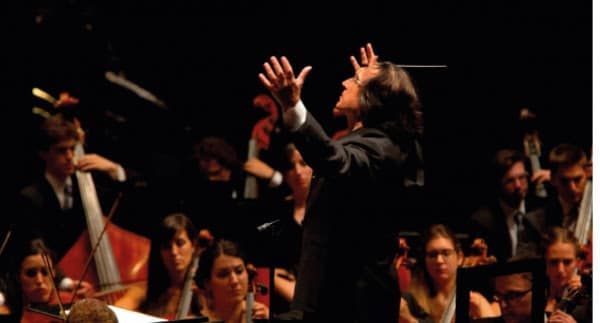Why the Chicago strike failed
mainMusicians of the Lyric Opera orchestra return to work today, knowing that they got much less than they struck for.
By the time Riccardo Muti came out yesterday with a fiery statement of support – ‘We must never forget this! We must support the musicians. Any action against them is an act against culture!’ – the ink was already drying on a deal in which the musicians agreed to give up four jobs and two out of their 24 weeks’ work.
So why did they have to concede?
From early assessments in Chicago, these factors emerge:
1 The musicians had no substantial fighting fund. They could not hold out for long.
2 The Lyric was about to cancel half the season.
3 Other house unions had undercut them, accepting the two-week shortening and some job losses.
4 They had made serious gains – as little as 10 days ago the Lyric was sticking on a 43% percent pay cut – andit made more sense to consolidate than to continue the confrontation.
In the end, no-one wins. But lessons will have been learned across the US music biz. For the next round.







I remember years ago we took The Phantom of the Opera to the Lyric from March to July. The musicians were delighted they had this extension to their season. Many did Ravenna and Grant Park too, but the Lyric season in those days struck me as incredibly short.
(Ravinia)
Thanks.
Will the jobs cut be from layoffs, or will they be from attrition? I guess they can always fill out the string sections with more freelancers?
And will they continue with the broadcasts?
From an earlier media release last week, it was mentioned that the decreased musician count would be acquired through attrition.
Muti is fast becoming a hot bag of air here in the Windy City.
His main base of support is through his sponsorship by the CSO board chair. There are rumblings of discontent within the orchestra and on the staff for the Maestro’s well known egotistic inclinations. No surprise there by those in the industry.
This agreement actually seems fair, given that the rank&file salary for 22 weeks is still higher than what the average per capita income household in the Chicago area. There is also a good deal of overtime pay when working in an opera house. Everyone knows that.
Throw in that most of the musicians get outside work in the Grant Park Orchestra, teaching, and playing the spring musical, their annual salaries will total out to numbers that are higher than base wages. Saying that they work 20 hours and then go home and practice for 20 hours each week is Tom Foolery.
Given that the Average Joe in Chicago is in the same boat after working a 50 work week (only two paid weeks of vacation for them), the musicians must have figured out that there was not much sympathy in the community for their position and if things went South with finances for the Opera, they would be held to blame by all the others that work at the institution and have come to agreement with management.
Perhaps they should line up to be first in the negotiation line next time the contracts are coming up for renewal.
wow, what are the “rumblings of discontent”, if you could disclose anything? very curious to know!
I cannot or I could compromise my identity.
I prefer to be mistaken for Michael Crawford.
“Saying that they work 20 hours and then go home and practice for 20 hours each week is Tom Foolery.”
Indeed, I always found that one of the more transparently disingenuous parts of the argument. “It’s not really 22 hours a week, because we have to practice so much to stay at a high level!” This is a very tough business and it’s hard to make it, to be sure, but I’ve known some mid-career professional musicians and no one really practices close to 20 hours a week in addition to their performance duties. It’s the kind of exaggeration they tell themselves but never question.
Sort of like how a physician once swore to me that doctors in America, when you calculate their long hours, “barely” make more than minimum wage. I invited him to do the math on that on the back of an envelope, and he promptly declined with a huff.
Yes, I have to agree with you on both points: Muti’s windbagery (or should I double the “g”?) and that the Lyric players got about the best they were going to get. Holding out longer and risking half the season being cancelled would have been worse.
A QUESTION for anybody in the know: Do the singers get paid when the orchestra goes on strike? I’m sure the chorus does – union contract and all, not their fault that the show can’t go on, etc. But the singers contracted to do the solo parts – they still get paid?
I would assume that IF more of the season were canceled, there’d be some arrangement that singers contracted for later productions would be released from their contracts, so they’d be free to take other work that might come up….
A 6% increase over 3 years is about the “national average” for orchestra/opera negotiations.
Agree with Old Man. (I just turned 65 so I guess that includes me, too!)
The root of the problems for both management and labor is the lack of funding caused by our unique and isolated system of arts funding by donations from the wealthy. It’s not found anywhere else in the developed world for the simple reason that it functions so poorly.
Chicago ranks 80th in the world, behind little cities in Europe most people have never heard of like Halle, Coburg, Essen, Minsk, Erfurt, Kassel, St. Gallan, and Bratislava, to name a few. With so little funding, and a shameful season of only 22 weeks, it’s only natural that Chicago behaves like an operatic backwater.
Never mind that it is America’s third largest city. The truly astounding feat is how Americans are so brainwashed and isolated from international perspectives that they do not even complain.
80th in the world for performances per capita.
William Osborne, how many times do you have to repeat the same old facts? I think you’ve posted this point 75 times over the years.
Instead of complaining all the time, how about actually doing something about it?
What should he do? Tell president Trump and the Republicans to increase arts funding by 80%?
We’re just grateful they didn’t completely eliminate the NEA or put Ted Nugent in charge of it.
Or opera just isn’t as popular in the U.S. as it is in Europe. If more people would buy tickets and go, the Lyric would probably add performances.
(Though I recall they did bask in the 100+% sold out performances of the early ’90s – until patrons like me dropped out because we….couldn’t get tickets.)
As Yogi Berra once said about a restaurant he used to go to: “That place got so popular, nobody goes there any more”.
Then why do all these international level players want to move to the US to play in US orchestras and opera companies?
I do not see the opposite happening. American trained musicians desire to stay here in America and do not desire jobs offshore.
Offshore jobs for the most part (aside from titled positions) are for also rans.
I think there are quite a few of us here in the US who would welcome a job in a European orchestra – but we don’t have legal permission to work there. Very unlikely an orchestra on either continent will jump through the hoops necessary to sponsor a section player, judging from what I see posted.
As for the offshore positions being only for also-rans, do you think the schools in Europe don’t turn out excellent players? Where do you think those world-class orchestras in Vienna, Berlin, Amsterdam, London, etc. get their players?
Most Americans probably find the prospect of not having to move to a foreign country where a different language is spoken to be more appealing, yes. Not sure why anyone would find this particularly surprising. And the ridiculous US tax system makes life even more miserable for expats than it does for those living here.
There are far more US musicians playing in Europe than European musicians playing in the US. And the difference in the numbers is not small, it is quite large for the simple reason that there are far more jobs available in the EU. If opera singers want to have genuinely professional careers, they are all but obligated to go to Europe.
Because Chicago fat cats would rather fund the Obama Presidential Center on the South Side.
Because George Lucas was willing to pour millions into his Star Wars Museum on the lake front, until he failed in his land grab and took his little toy with him back to LA.
Because the Pritzker family would rather fund the Pritzker School of Law at Northwestern, and the Pritzker Medical School at the University of Chicago, and the Pritzker Pavillon in Millennium Park.
Point is, Lyric Opera needs to offer naming rights, no one cares about programming. TRUMP Opera House (if only he’d pay as promised!).
Interesting comments